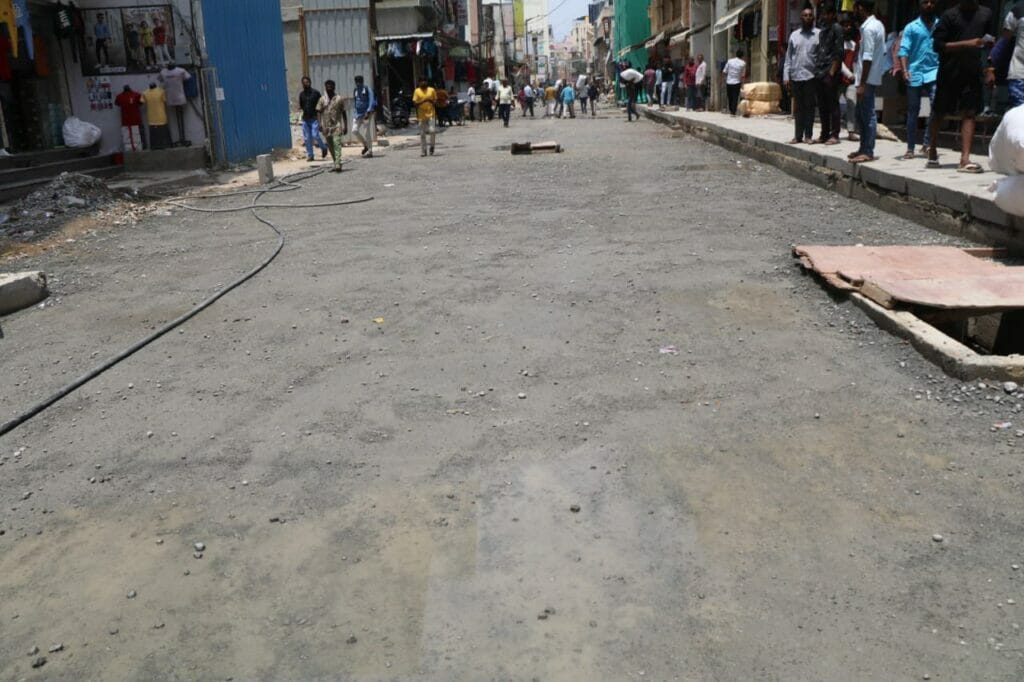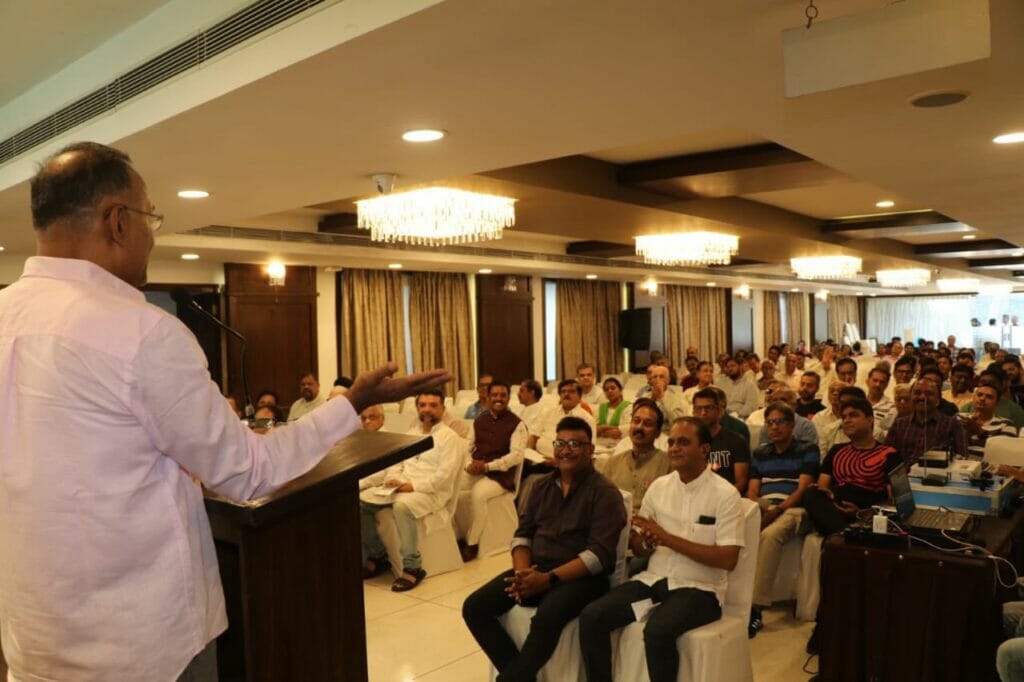Indian National Congress’ Dinesh Gundu Rao and the incumbent Member of the Legislative Assembly (MLA) of Gandhinagar met with apartment owners in Gandhinagar on April 8th to listen to their grievances. He promised to devise solutions for the same. The former state Minister of Food, Civil Supplies and Consumer Affairs and president of Karnataka Pradesh Congress Committee, has won from Gandhinagar five times in a row.
He had called out the ruling party for the crumbling infrastructure in the city and criticised the inaction over pothole-ridden roads. He holds a B.E. in Electronics and Communications from BMS College of Engineering.
Ahead of the assembly polls, in an interview with Citizen Matters, Dinesh spoke about his plans for his constituency (Gandhinagar) if voted back into power, increasing the efficiency of the BBMP, and women’s safety, among other issues.
What are the three priorities you planned to fulfil as an MLA in the last term? Were you able to achieve them? And have they changed for the current term?
We have been able to improve the traffic movement at Okalipuram junction. After every rain spell, the Kino theatre in Seshadripuram would be flooded. We have managed to solve this.
We have constructed a multilevel car park in Gandhinagar. While we haven’t been able to open it, the structure is ready. We wanted to introduce post graduation courses in the BBMP college on Magadi Road. We have received permission for the same, so now, from nursery to PG, there are classes in one institution. There was a slum with 40 houses in an unauthorised location. We have identified a place where the construction is underway and we are in the midst of shifting the slum inhabitants to pucca houses there.

In five wards (of Gandhinagar), we have been able to bring about improvements. But in the central business district of Chickpet, we need to improve the roads, access, and drainage. It needs comprehensive development as we have done in the Majestic area, including roads, footpaths, sanitation, water, etc.
Chickpet is not an easy area to work with because of the narrow lanes, the dense population, and the commercial and residential areas being together. Avenue and Cottonpet roads have been improved. The Sultanpet road, which was a huge problem, has now been upgraded. It will be inaugurated next week. BVK Iyengar Road needs more work, which is my main vision for the next term.
You have been holding consultations with the residents in your constituency. What were the major issues that emerged from this and how do you plan on addressing them?
There are issues concerning traffic, garbage, and their own apartments where the developers haven’t done a good job. We have been able to speak with them with the residents and find solutions. But some of them are legal issues, which are tricky. Traffic is an issue for which everyone wants an independent solution, but we are trying to find a collective one. But overall, we have had a good interaction with them, and they have been cooperating well with us.
Read more: What has Dinesh Gundu Rao been up to in five years?
BBMP has been without an elected council for three years now. Are you or your party advocating for fast-tracking of elections?
In my personal opinion, BBMP is a huge, ungovernable body that needs to be split up into more corporations to localise decision-making. It is a government in itself. Every decision that has to be taken goes up to the level of the BBMP Commissioner, causing a huge delay in the process.
We have to decentralise the whole administration. It is impossible for the Commissioner to look into 243 wards. Each Commissioner is there for one or two, a maximum of three years, but by the time they understand what is happening, they will be moved out. We need to improve and change the structure.
I hope if the Congress government comes to power, we split up the corporation and decentralise its functions. This will foster competition and improve efficiency.
Gandhinagar hosts the key stations of BMTC, KSRTC and the metro. Considering how the BMTC is key to bridging the first and last-mile connectivity to these stations, have you questioned its low budgetary allocations in the assembly?
Because Gandhinagar has all of these stations, there are no connectivity issues per se. These are all old systems in place. They are inter-connected so people can more or less easily access the metro or the buses. Overall, BMTC definitely requires government support. Without subsidising its services, you cannot expect BMTC to generate its own profit; then the burden will be shifted onto the public.
By investing in the BMTC, there are long-term savings for the government in terms of improving health, pollution, etc. In some way, the governments neglect this. They tend to look at it as a burden and debate why they have to provide funds for it. We have to increase the support for BMTC. That is the only way you can expect it to run by itself and earn its own revenue.
An FIR was filed against the residents who were peacefully protesting the proposed Sankey flyover. If voted to power, how will you or your party ensure that the fundamental rights of the citizens are protected?
We are a democracy. People have the right to express their opinion as long as they are not causing a nuisance or obstructing people’s activities. I think filing cases or FIRs is an extreme step that should not be done.

Can you tell me how you have utilised your MLA Local Area Development Funds? Can we access the accounts?
Yes, it is in the public domain.
More or less, I have utilised 100% of it. Most of it has been used for community buildings and providing basic infrastructure, like toilets. In some slum areas, we have built road facilities for them. We have used the funds for helping out organisations that run hostels to help them build hostel rooms. We have also used it for providing drinking water.
The government’s approach to women’s safety is by installing CCTV cameras. You have been vocal about women’s safety. What is your opinion on this approach, which is more retributive than preventive?
How men perceive women has to change first, the mindset has to change. This should stem from the way we live as a society, how we teach our children to respect others. Whether we install CCTV cameras, have laws, etc. you can see that many of them have not been effective enough. But I think the mindset has to be worked on and that is a long-term process. This has to come from a lot of partnerships from the government, civil society organisations, and society itself.
Bengaluru currently does not have a Masterplan. How does this affect Gandhinagar and other older areas of the city, which have often been affected by poor planning?
There is limited scope for us to plan in our area. If you look at Byatrayanapura, KR Puram, and Mahadevapura, there is a lot more scope for planning due to the area that is available. Whether you are making a road, path or playground, all of that is to be integrated into the plan. There is a Comprehensive Development Plan (CDP), but a new one has to come out.
If we do not have a CDP that hasn’t been worked on properly, it leads to haphazard growth. Older areas are, as it is, are more or less fully developed. In the sense that there is limited empty space or land available.
According to me, any public land that is available should not get replaced for any other purpose apart from a park, playground or civic amenity. That should be the focus. Old city areas do not face that much of a problem, because the city has already grown and we can’t demolish, rebuild or we cannot plan anew. The scope of the Masterplan is, therefore, limited to us. What we can do is prevent this rampant commercialisation of residential areas.
these politicians are all deflecting. All we need is implementation of 74th Amendment, ie., An autonomous Metropolitan Committee as planning authority. And a devolved, decentralised and unified BBMP – It will be a city govt. I wonder if these politicians are even aware of the 74th Amendment.